2002 Polish regional assembly election|
|
|
| Registered | 29,572,213 |
|---|
| Turnout | 13,078,372 (44.23%)
 1.12pp 1.12pp |
|---|
|
|
First party
|
Second party
|
Third party
|
|
|
|
|
|
| Leader
|
Leszek Miller
|
Andrzej Lepper
|
Roman Giertych
|
| Party
|
SLD-UP
|
SRP
|
LPR
|
| Leader since
|
1 July 1999
|
10 January 1992
|
26 January 2002[b]
|
| Last election
|
31.8%, 329 seats
|
12.0%, 89 seats[a]
|
Did not exist
|
| Seats won
|
189
|
101
|
92
|
| Seat change
|
 140 140
|
 12 12
|
Did not exist
|
| Popular vote
|
2,752,318
|
1,784,610
|
1,603,081
|
| Percentage
|
24.7%
|
16.0%
|
14.4%
|
| Swing
|
 7.1pp 7.1pp
|
 4.0pp 4.0pp
|
Did not exist
|
|
|
|
Fourth party
|
Fifth party
|
Sixth party
|
|
|
|
|
|
| Leader
|
Maciej Płażyński
Lech Kaczyński
|
Jarosław Kalinowski
|
Henryk Kroll
|
| Party
|
POPiS
|
PSL
|
MN
|
| Leader since
|
2002
|
11 October 1997
|
23 March 1991
|
| Last election
|
Did not exist
|
12.0%, 89 seats[a]
|
0.6%, 7 seats
|
| Seats won
|
79
|
58
|
7
|
| Seat change
|
Did not exist
|
 31 31
|
 0 0
|
| Popular vote
|
1,351,856
|
1,207,161
|
54,385
|
| Percentage
|
12.1%
|
10.8%
|
0.5%
|
| Swing
|
Did not exist
|
 1.2pp 1.2pp
|
 0.1pp 0.1pp
|
|
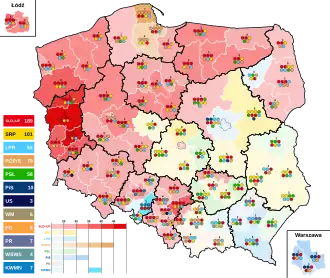 |
The 2002 Polish local elections were held in two parts, with the first round on 27 October and the second on 10 November 2002. All 16 provincial voivodeship sejmiks, 314 powiat county councils, 2,748 Gmina municipal councils, and town and city mayors were up for election. The event was the first of its kind to allow direct elections for mayors of municipalities.[3] The local polls followed one year after the decisive victory of the Democratic Left Alliance in the 2001 parliamentary elections and were seen as a test of the popularity of the Democratic Left Alliance and Polish People's Party coalition government under Prime Minister Leszek Miller.
Voivodship councils
| Party | Votes | % | Seats |
|---|
| Democratic Left Alliance – Labor Union | 2,752,318 | 24.65 | 189 |
| Self-Defence of the Republic of Poland | 1,784,610 | 15.98 | 101 |
| League of Polish Families | 1,603,081 | 14.36 | 92 |
| Civic Platform – Law and Justice Coalition Committee | 1,351,856 | 12.11 | 79 |
| Polish People's Party | 1,207,161 | 10.81 | 58 |
| Law and Justice | 261,983 | 2.35 | 10 |
| Confederation Movement for Defending the Unemployed | 261,633 | 2.34 | 0 |
| Self-Governance Union | 256,012 | 2.29 | 3 |
| Real Politics Union | 254,013 | 2.27 | 0 |
| Alternative Labour Party | 167,349 | 1.50 | 0 |
| Małopolska Community | 135,424 | 1.21 | 6 |
| Civic Platform | 127,828 | 1.14 | 5 |
| National Party of Retirees and Pensioners | 127,299 | 1.14 | 0 |
| Together Poland | 121,841 | 1.09 | 0 |
| Podkarpacie Together | 106,504 | 0.95 | 7 |
| Self-Governing Community of the Silesian Voivodeship | 99,741 | 0.89 | 4 |
| Anticlerical Poland | 94,614 | 0.85 | 0 |
| Silesian Autonomy Movement | 56,632 | 0.51 | 0 |
| German Minority | 54,385 | 0.49 | 7 |
| 2002 Community | 50,405 | 0.45 | 0 |
| Social Initiative Self-Governance Community | 38,297 | 0.34 | 0 |
| Lesser Polish Forum of Women | 34,100 | 0.31 | 0 |
| Confederation of Independent Poland | 29,406 | 0.26 | 0 |
| Germans of Upper Silesia | 20,412 | 0.18 | 0 |
| Truth and Common Good | 19,802 | 0.18 | 0 |
| Our Podlasie | 17,157 | 0.15 | 0 |
| Belarusian Electoral Committee | 15,544 | 0.14 | 0 |
| Polish Economic Union | 12,406 | 0.11 | 0 |
| OPTIMAL | 8,498 | 0.08 | 0 |
| Defence of Podlasie | 6,985 | 0.06 | 0 |
| Defence of Polish Land | 6,728 | 0.06 | 0 |
| Peasants Together | 6,565 | 0.06 | 0 |
| Greens of the Republic of Poland | 4,788 | 0.04 | 0 |
| Association for the Help of Children in Gmina Gogolin | 4,456 | 0.04 | 0 |
| Driving Instructor's Association | 4,073 | 0.04 | 0 |
| Front for Włocławek | 3,985 | 0.04 | 0 |
| Common Initiative - Poland Podlasie | 3,867 | 0.03 | 0 |
| National Alliance of Retirees and Pensioners | 3,415 | 0.03 | 0 |
| Self-Governance Agreement of Powiats | 3,135 | 0.03 | 0 |
| Family | 2,986 | 0.03 | 0 |
| Entrepreneurship of the 21st Century | 2,986 | 0.03 | 0 |
| Alicja Wojciechowska Committee | 2,971 | 0.03 | 0 |
| Committee of Growth for Sierpc and the Powiat | 2,675 | 0.02 | 0 |
| Z. Krzeszowski Committee | 2,659 | 0.02 | 0 |
| KW Stowarzyszenia Śląska Liga Walki z Rakiem | 2,633 | 0.02 | 0 |
| Organisation of the Polish Nation | 2,559 | 0.02 | 0 |
| Rzeczpospolita Babska | 2,496 | 0.02 | 0 |
| Active Women | 2,495 | 0.02 | 0 |
| Tczew Powiat - Alternative 2002 | 2,433 | 0.02 | 0 |
| Grażyna Kutzner Committee - Supporters of Law and Order | 2,389 | 0.02 | 0 |
| Committee in Service of Wielkopolans | 2,298 | 0.02 | 0 |
| Railwaymens' Association | 2,061 | 0.02 | 0 |
| Wałowski Committee | 1,792 | 0.02 | 0 |
| Kuyavian Citizen's Association "Our Region" | 1,753 | 0.02 | 0 |
| Małopolska Right-wing | 1,461 | 0.01 | 0 |
| Independents in the 2002 elections | 1,412 | 0.01 | 0 |
| KW Fundacja Promocji Twórców Kultury i Sztuki im. A. Zauchy | 1,393 | 0.01 | 0 |
| Right for the Republic | 1,161 | 0.01 | 0 |
| Forum of Retirees and Pensioners | 1,055 | 0.01 | 0 |
| Opportunity for Poor Poles Truth and Labor | 982 | 0.01 | 0 |
| Citizen's Union | 921 | 0.01 | 0 |
| Self-Governing League of Ziemia Jastrzębska | 841 | 0.01 | 0 |
| Truth - List of Irena Puciłowska | 781 | 0.01 | 0 |
| Total | 11,165,501 | 100.00 | 561 |
|
| Valid votes | 11,165,501 | 85.37 | |
|---|
| Invalid/blank votes | 1,912,871 | 14.63 | |
|---|
| Total votes | 13,078,372 | 100.00 | |
|---|
| Registered voters/turnout | 29,572,213 | 44.23 | |
|---|
| Source: National Electoral Commission[4] |
References
- ^ Koziełło, Tomasz (2015). "Elita polityczna Ligi Polskich Rodzin (2001—2007)" (PDF). Studia Politicae Universitatis Silesiensis (in Polish). 15 (1): 197. ISSN 2353-9747.
Elita faktyczna LPR, czyli ludzie rzeczywiście decydujący o działaniach partii, obejmowała niewielką, kilkuosobową grupę osób. Najważniejszą spośród nich był Roman Giertych, w chwili powstania Ligi 29-letni adwokat, wiceprezes Stronnictwa Narodowego. W ten sposób widzieli jego rolę w LPR zwolennicy, przeciwnicy i neutralni obserwatorzy życia politycznego. O ile w pierwszych dwóch latach jego pozycję można określić jako jednego z 3 decydentów, o tyle po 2003 roku stał się głównym przywódcą partii, wyrazicielem jej poglądów i kreatorem polityki ugrupowania. O odgrywanej przez niego roli w Lidze świadczy fakt obecności przewodniczącego Kongresu i prezesa LPR w mediach — jego wypowiedzi, wywiady z nim oraz wystąpienia, zaprezentowane na łamach prasy narodowej („Myśl Polska", „Racja Polska", „Nasz Dziennik"), centrowej („Rzeczpospolita", „Gazeta Wyborcza") i na stronie internetowej partii zajmują mniej więcej tyle miejsca w omawianym okresie, ile te same treści związane z pozostałymi członkami kierowniczych gremiów. Oznacza to z jednej strony uczynienie ze swojej osoby postaci, która ma prawo w pierwszej kolejności wypowiadać się publicznie na temat spraw partyjnych, z drugiej natomiast uznanie R. Giertycha przez media za wyraziciela stanowiska LPR.
- ^ Koziełło, Tomasz (2022). "Koncepcje ustrojowe polskiego obozu narodowego w XXI wieku na przykładzie Ligi Polskich Rodzin i Ruchu Narodowego". Polityka i Społeczeństwo (in Polish). 20 (1). Wydawnictwo Uniwersytetu Rzeszowskiego: 1. doi:10.15584/polispol.2022.1.5.
Na czele LPR w okresie największych jej wpływów politycznych stali Marek Kotlinowski, wieloletni prezes Zarządu Głównego (2001–2006) i przewodniczący Kongresu (2006) partii, oraz Roman Giertych, przewodniczący Kongresu (2002–2006) i prezes Zarządu Głównego (2006–2007).
- ^ "Poland's local polls test EU support". BBC News. 2006-09-22. Retrieved 2011-02-13.
- ^ "Samorząd 2002".
Notes
External links

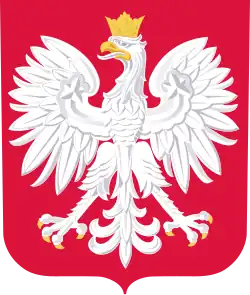
.jpg)
_(cropped).jpg)
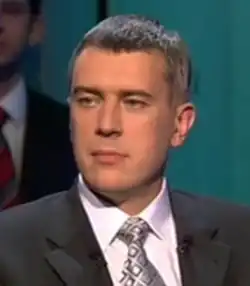
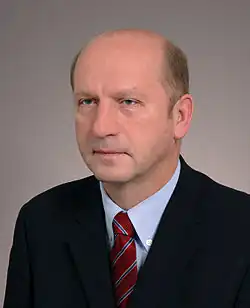
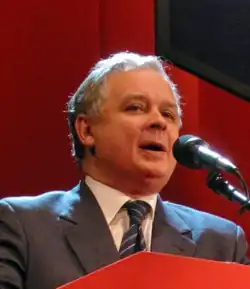
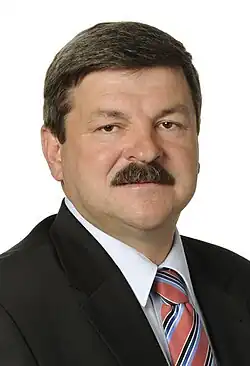
_mit_Henryk_Kroll_(cropped)_3.jpg)